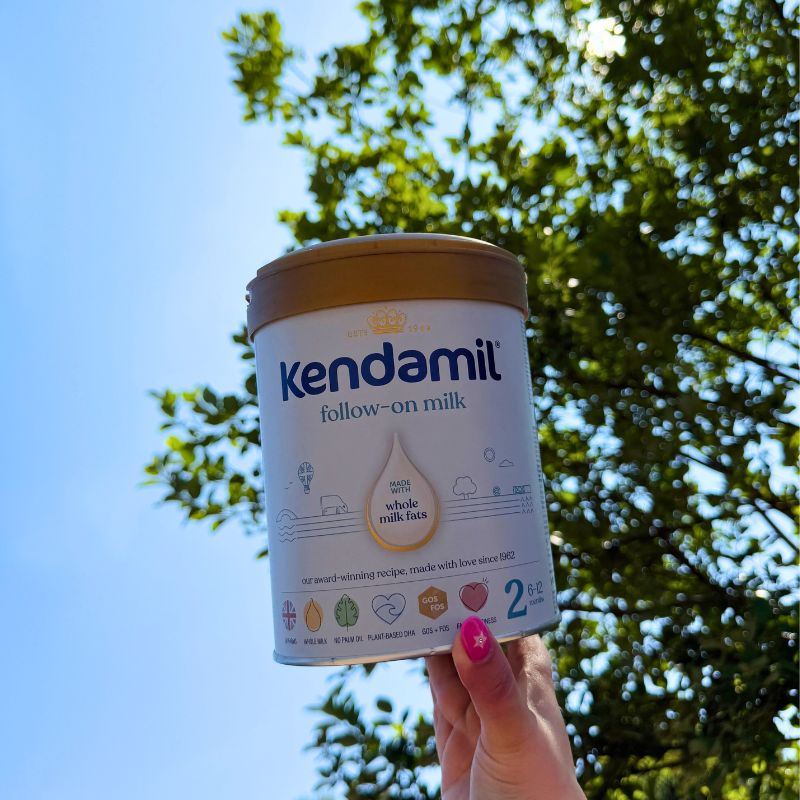What are the signs it's time to switch my baby's formula?
Sometimes, despite our best efforts to keep our little ones content, babies can experience discomfort or react to certain ingredients in their formula. It’s common for babies to experience some digestive discomfort or feeding problems in those early days as their digestive systems mature, so might not always be linked to the formula they’re on. If you’re worried about feeding problems, check out our blog about common feeding issues and what you can do!
Just like us, babies have different taste and texture preferences, and you might find they are better suited to a different brand of formula based on taste alone! At Kendamil, we choose to use reduced levels of vegetable oils, and instead use whole milk as our main ingredient, meaning a yummy, creamy taste for your little one! We also don’t use fish oil, and instead use plant based DHA, so your baby is still getting all the important omega 3 they need, with no nasty smell or taste. You won’t find any palm oil, soy, or other nasties like maltodextrin in our recipe, either. Our award-winning recipe is why both parents and babies LOVE our milks.
What are the different types of follow-on formula available?
Here at Kendamil we pride ourselves on using only high quality ingredients, which is why more than ever, parents are choosing Kendamil over other formulas or are making the switch. We’re also still one of the most affordable follow-on formulas in the UK.
Baby follow-on formula brands comparison

Maybe you’re looking for an easier way to stock up on your formula more easily? If this is the case, you should check out our subscription service! Simply set up an account on Kendamil.com, choose which products you want delivered monthly, and we’ll ship them straight to your door each month, with free delivery! We’re also available in all supermarkets as well as retailers such as Boots and Superdrug.
How to switch baby formula brands
Before you dive into switching baby formula brands, it's crucial to seek the advice of healthcare professionals, as recommended by the NHS. Consulting with your healthcare provider ensures that any changes are tailored to your baby's individual requirements, taking into consideration their medical history and any concerns you might have. Abrupt changes can sometimes make the issue worse, rather than alleviate it. Therefore, a thoughtful and gradual transition is highly recommended to ensure your baby's well-being and comfort throughout the process. Once you've got the green light from your trusted healthcare provider, it's time to embark on the transition journey.
Baby formula transition tips:
Best way to switch baby formula: You want to make the transition a gradual one. Abrupt changes can sometimes upset your baby's delicate digestive system. To help your little one transition and adjust to a different texture or taste, a slower phased approach can help them get used to it. You can start this by swapping one feed a day of your current formula, to your new one. Then, as each day goes on, you can swap out one extra feed. Over the course of several days to a week, continue gradually adjusting your baby's diet to include the new formula, until they are exclusively on the new brand. We’ve created a helpful chart to explain this better:

When to switch baby formula? You don’t want to make the switch without having first spoken with your health visitor. There may be other issues at hand such as an allergy or another health issue not related to their formula. Explore all avenues before switching formulas.
How long does it take to transition baby formula? It can take some babies up to a week to transition to a new formula or perhaps longer. Go at their pace and pick a time when you aren’t busy with other commitments so you can really be attentive to their needs and comfort.
Side effects of switching baby formula
All UK baby formulas are safe for your baby, so although there shouldn’t be anything too concerning when switching formulas, you will want to keep a lookout for these digestive changes below. These changes are usually temporary as your baby's digestive system adjusts to the new formula. However, if you notice any concerning symptoms or if your baby seems unusually uncomfortable, don't hesitate to reach out to your midwife, health visitor or GP.
Stool Changes: It's quite common to observe changes in your baby’s stool patterns. You might notice shifts in colour, consistency, or even frequency. While it's understandable to feel a bit concerned, rest assured that this is typically a natural response as your baby's digestive system adjusts to the new formula. We understand that navigating the realm of baby poo can be a bit overwhelming, so we've prepared a helpful guide to assist you in deciphering the joys of baby poo. Find it here!
Gas and Bloating: It's not uncommon for some babies to experience temporary bouts of gas or bloating during the transition phase to a new formula. You can lend a hand in alleviating their discomfort by trying gentle techniques such as tummy massages and bicycle leg movements. These simple yet effective methods can work wonders in providing relief!
Spitting Up: Occasional spit-up is normal for many babies, but you may notice changes in frequency or volume during the transition period. This is typically temporary and should improve as your baby settles into the new formula.
Fussiness: Rest assured, it's perfectly normal for your little one to display some signs of discomfort or fussiness during the adjustment period. After all, change can be a bit unsettling for anyone, especially tiny tots! However, you can help ease their transition by showering them with soothing cuddles and affection.
Transitioning to a new baby formula can feel like a daunting task, but by consulting with a healthcare professional beforehand, gradually transitioning, and observing your baby's digestive changes, you can ensure a happy tummy and a contented little one.
As always, if you have any questions or concerns about selecting a new baby formula or coping with formula changes, don't hesitate to reach out to our helpful customer service team, made up of parents like you! Your baby's health and well-being are our top priorities, and we're here to support you every step of the way!

















